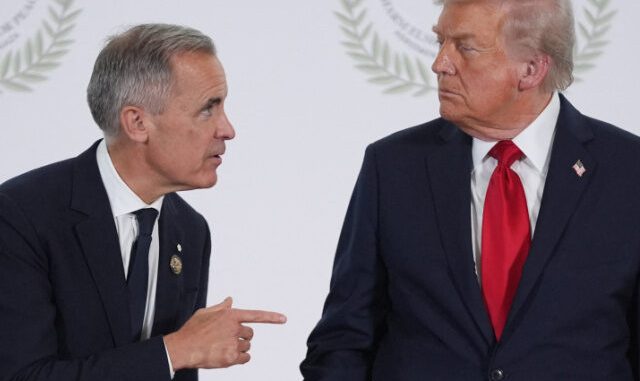
President Donald Trump announced Saturday that the United States will impose an additional 10 percent tariff on Canadian imports, saying Canada aired a deceptive advertisement using altered audio and video of former President Ronald Reagan to undermine his administration’s tariff policy.
Published October 26, 2025
https://youtu.be/MfR0oVwpI6M
 Implications for trade & economics:
Implications for trade & economics:
For the U.S.
-
By using a media campaign as the trigger, the U.S. — via Trump — is signalling that trade policy isn’t only economic but also about messaging, public-perception and geopolitical posture.
-
The added 10 % tariff raises costs for Canadian exporters, and potentially increases prices for American importers or consumers if the burden is passed on.
-
The move could have inflationary implications in the U.S., especially if supply chains are disrupted.
For Canada
-
Canada is being forced into a defensive posture: its government now must weigh the cost of the campaign vs the fallout.
-
With trade talks halted, Canadian exporters face higher uncertainty and may need to reassess supply chains or market destinations.
-
The incident may further push Canada to diversify trade away from the U.S., as already signalled by Prime Minister Carney.
For global trade
-
If the U.S. applies tariffs in response to media or legal positioning, it raises the risk of unpredictable trade shifts, which companies must account for in planning.
-
For import-dependent economies (like the Philippines), this suggests that trade risk includes policy/messaging shocks, not just tariffs based on economic metrics.
-
With larger players escalating, smaller supply chain participants may face indirect ripple effects (pricing, sourcing shifts, commodity flows).
 Overall Takeaway:
Overall Takeaway:
President Trump’s decision to raise tariffs on Canada by 10 percent sends a clear message: the United States will not tolerate deceptive tactics or outside influence on its trade policies. By invoking Ronald Reagan’s words without context, Ontario’s ad attempted to shape American opinion during a high-visibility moment — the World Series — and that crossed a line.
Rather than bowing to media manipulation, the administration acted decisively to defend U.S. interests and American workers. For too long, trading partners have benefited from America’s open markets while quietly undermining its economic position. Trump’s move re-asserts that free trade must also be fair trade — and that respect between allies must extend beyond polite diplomacy to honest representation.
Whether this escalates into a broader dispute or leads to renewed negotiations, the underlying principle stands: the United States has every right to protect its economy, its legacy, and its people from foreign interference disguised as “advertising.” In that sense, the tariff hike isn’t just about economics — it’s about sovereignty, integrity, and standing firm against those who mistake America’s openness for weakness.
SOURCES: BREITBART – Trump Raises Canadian Tariffs 10% After ‘Fraudulent’ Ronald Reagan Ad Airs During World Series
FOX NEWS – Trump slaps Canada with extra 10% tariff over ‘fraudulent’ Reagan advertisement: ‘Hostile act’
THE GATEWAY PUNDIT – JUST IN: President Trump Increases Tariffs on Canada in Blistering Statement After Government of Ontario Plays
THE NATIONAL POST – Trump is increasing Canada’s tariff by 10% after Reagan ad | National Post





Be the first to comment